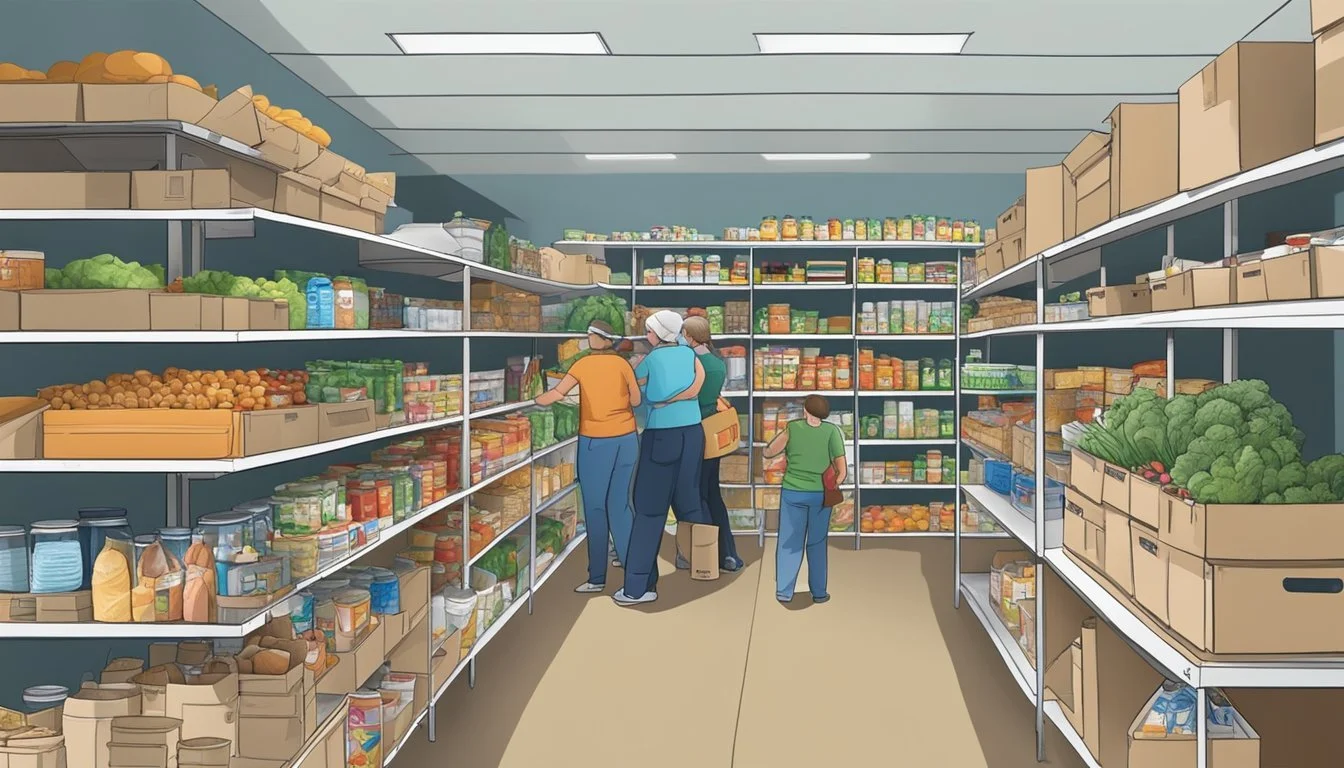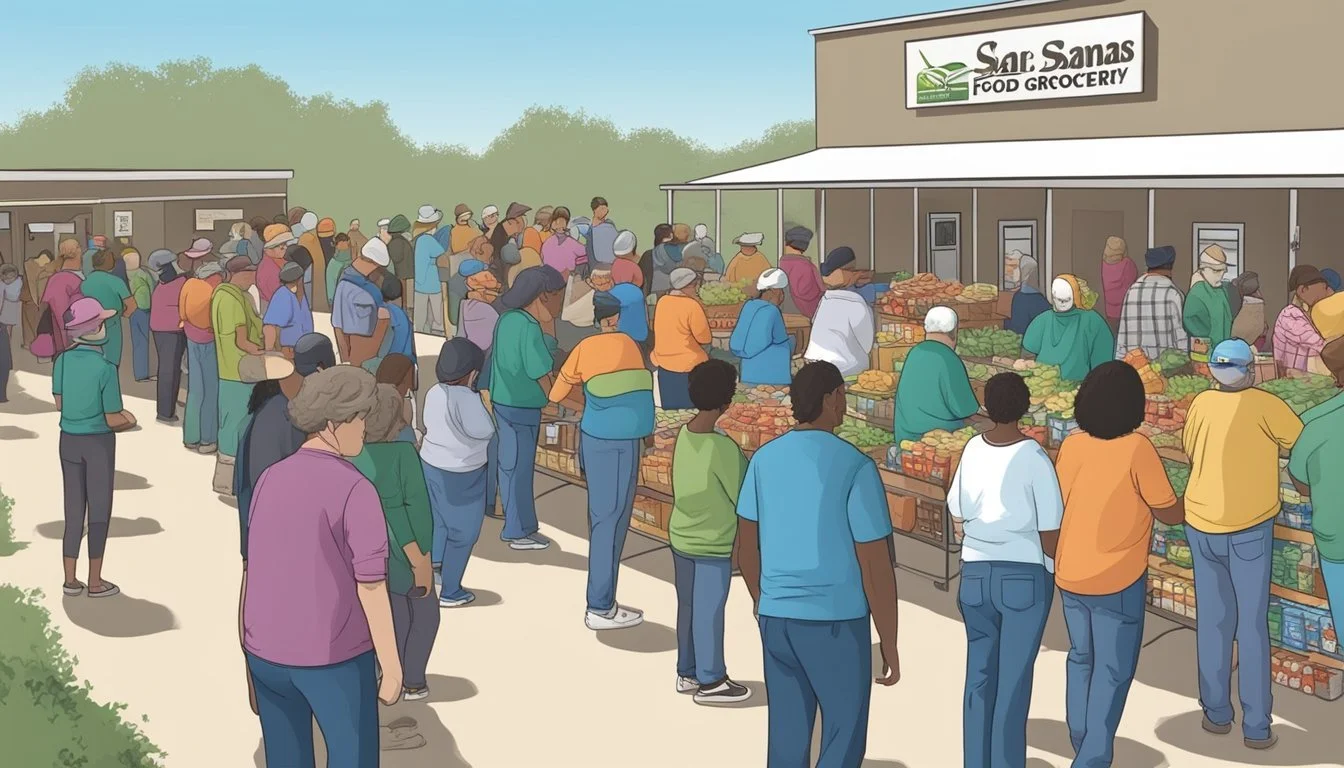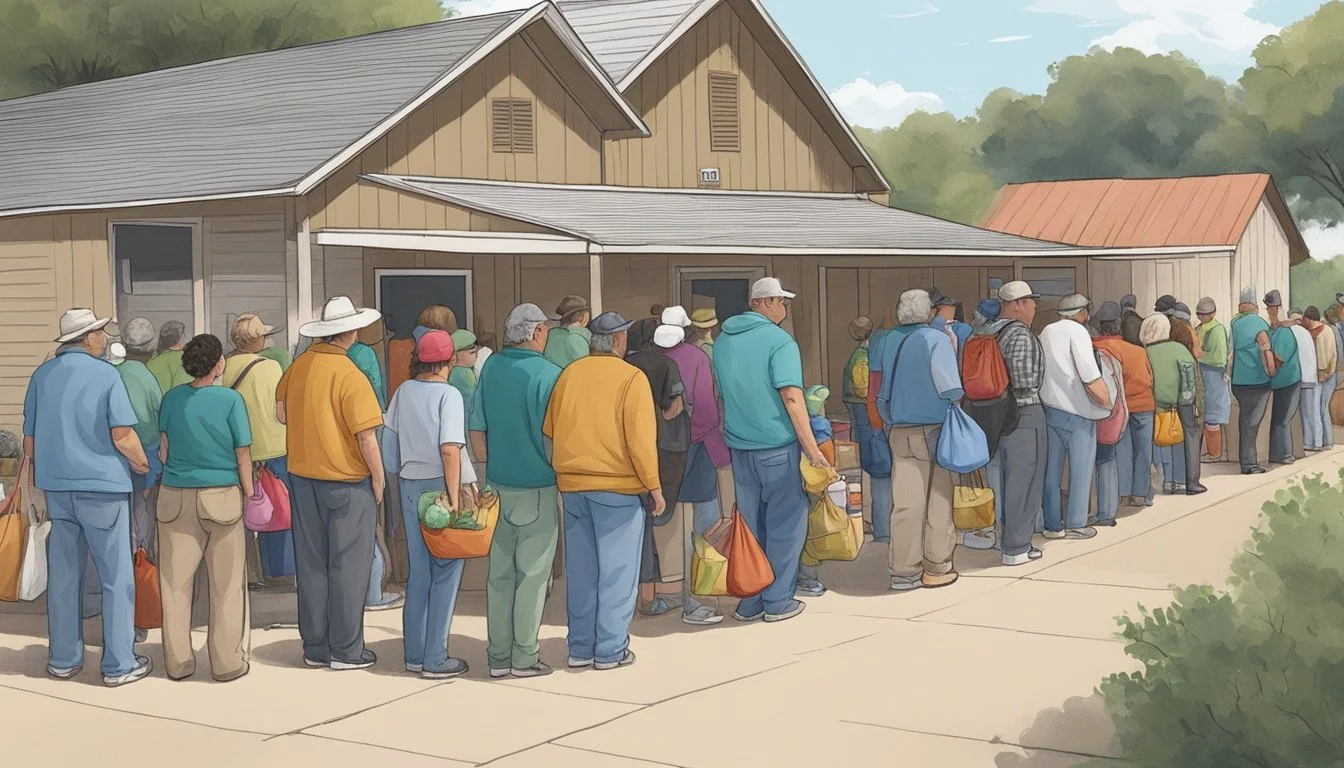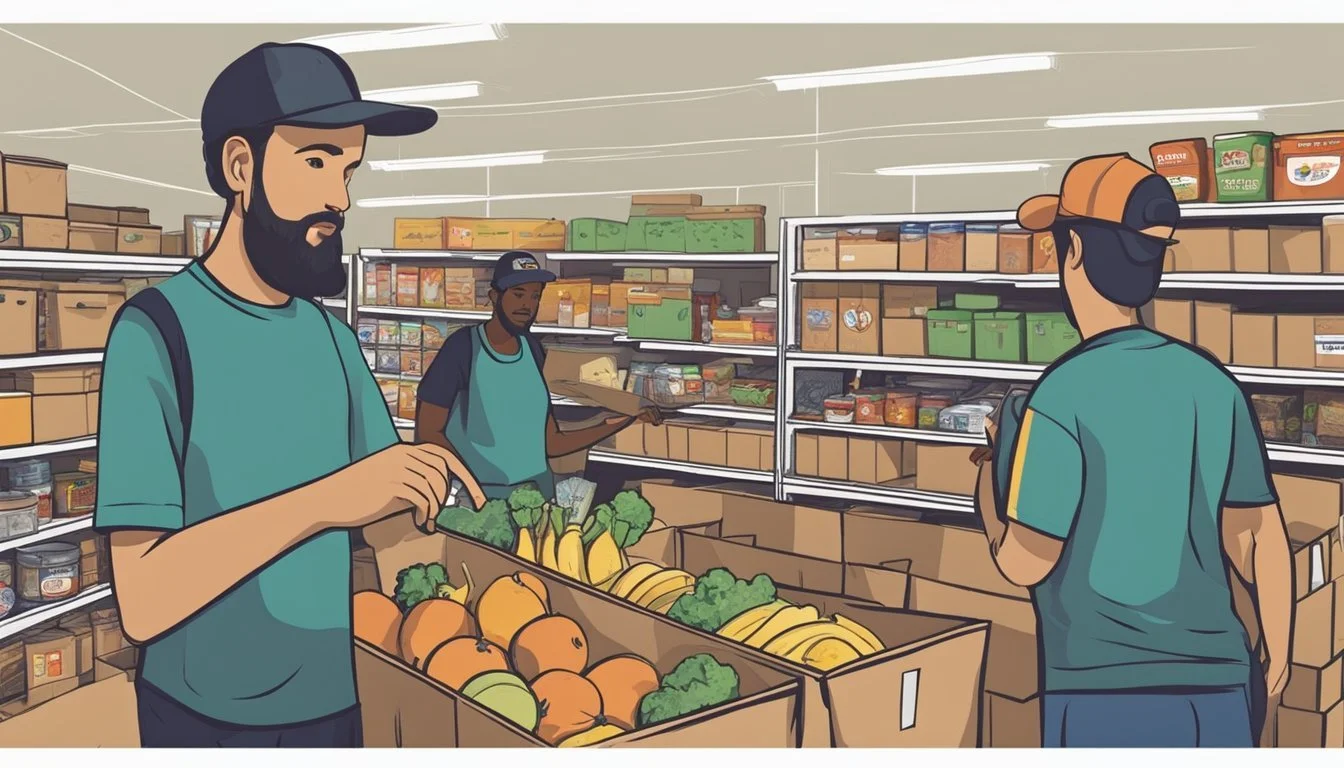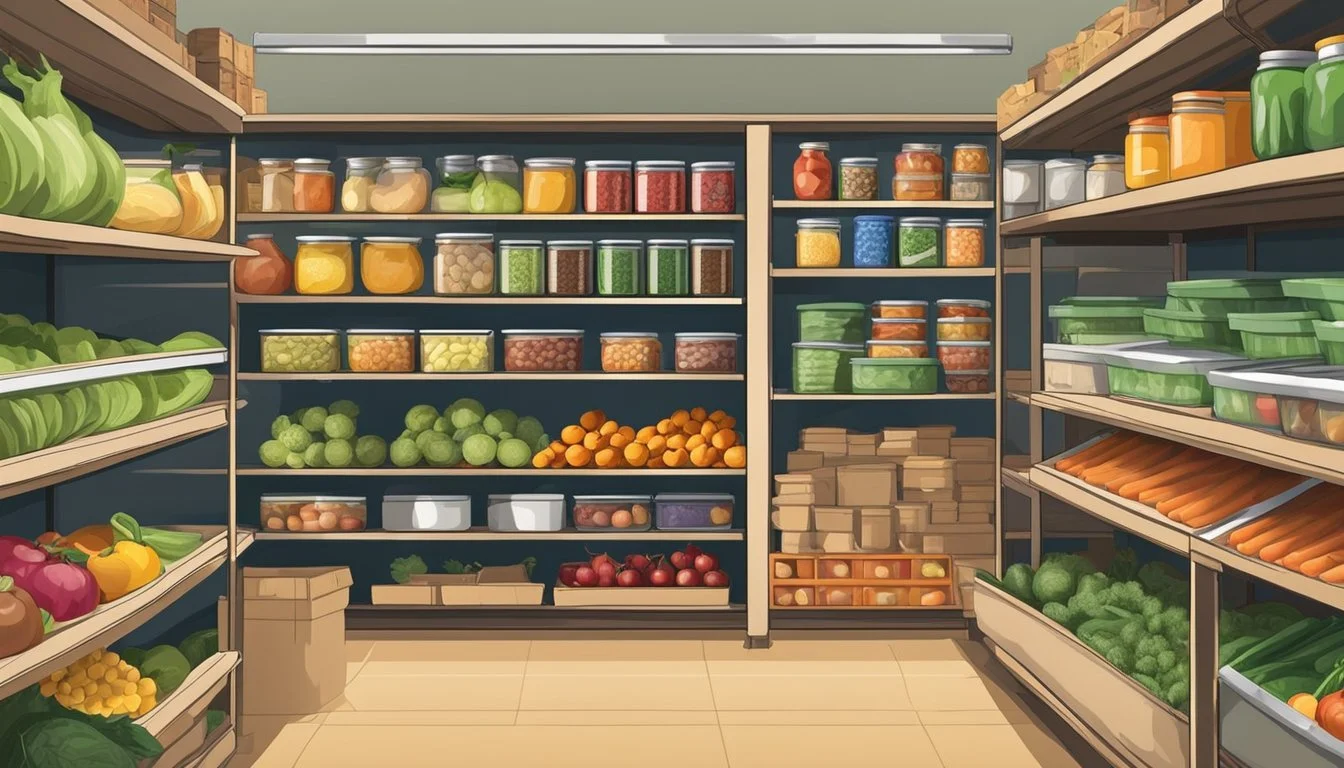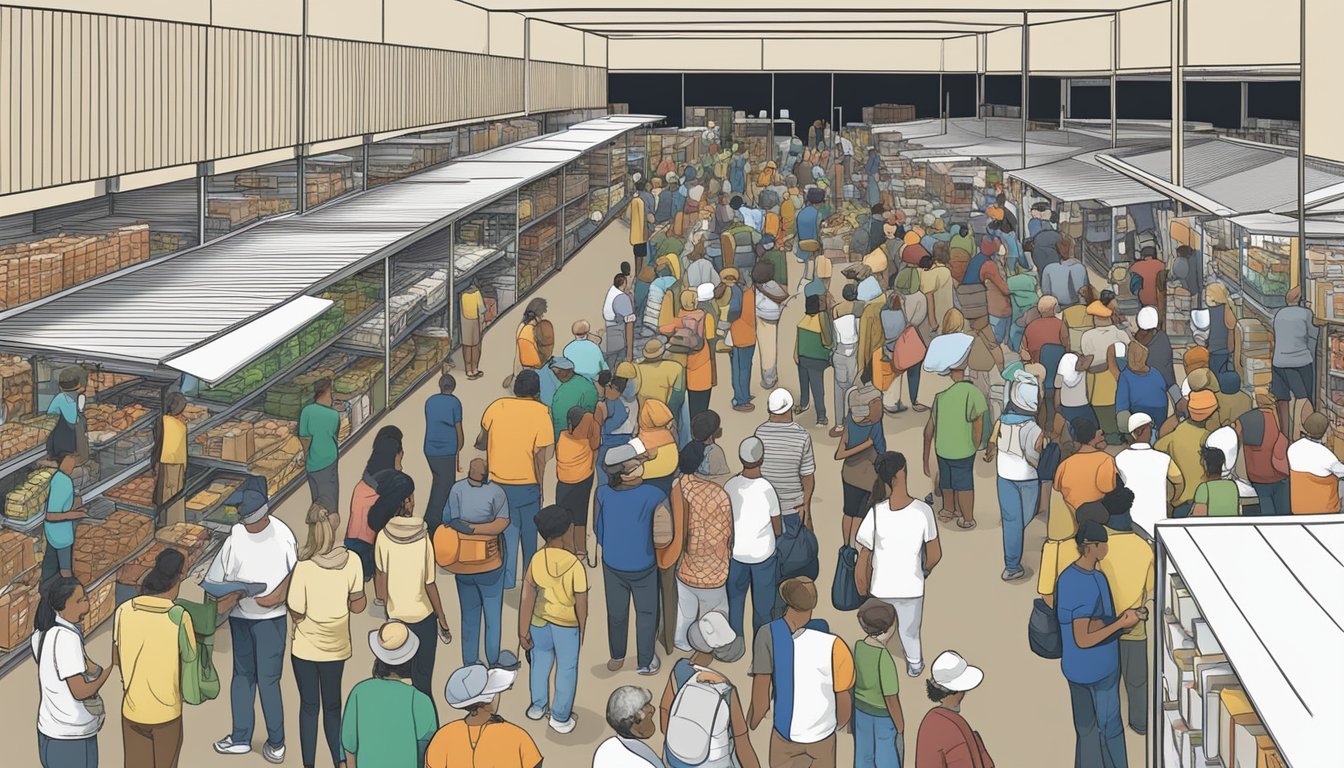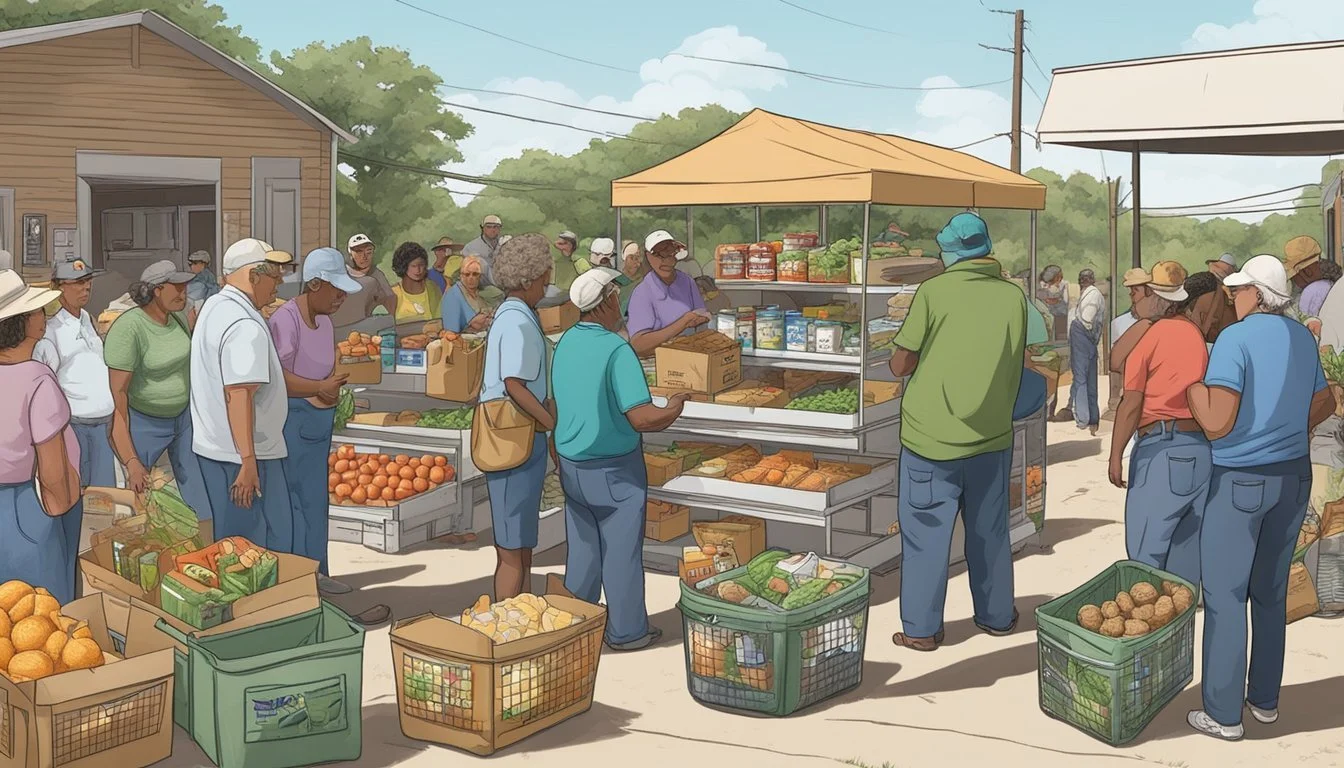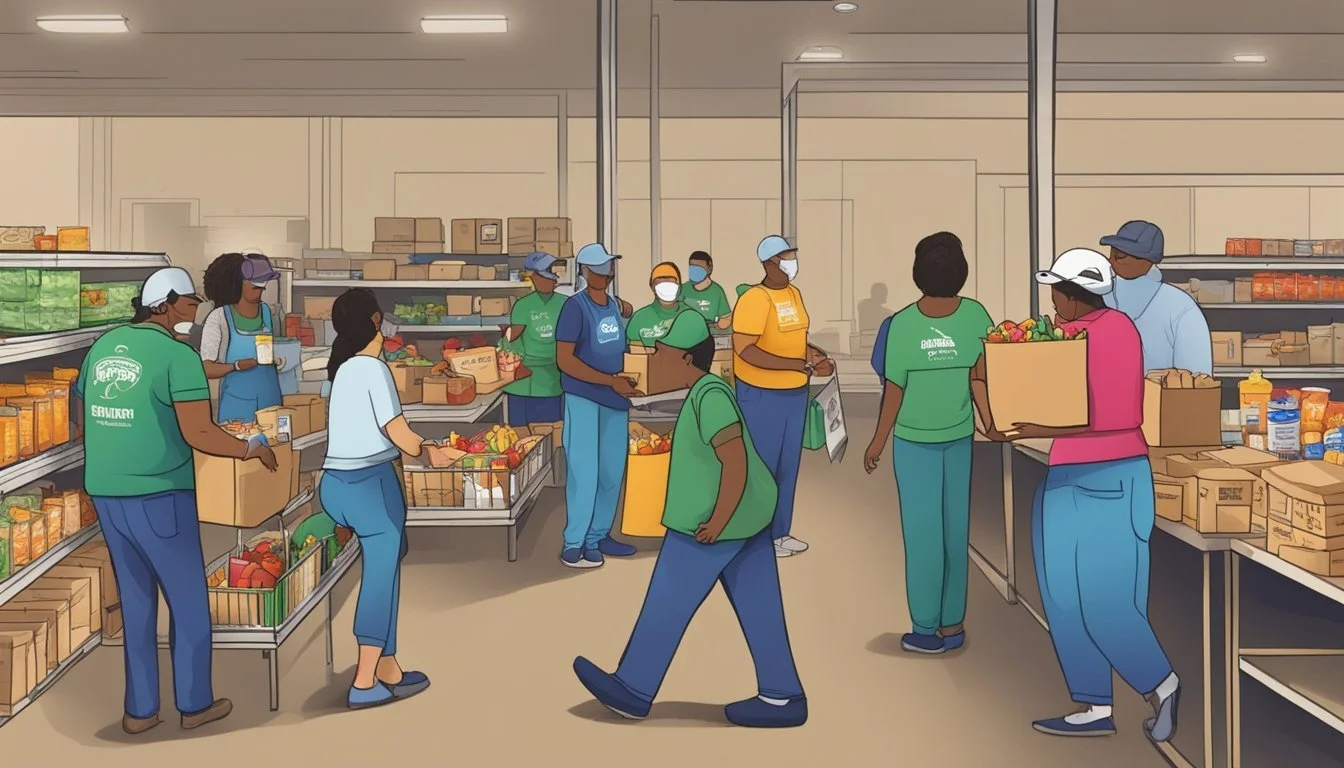Free Groceries and Food Pantries in San Saba County, Texas
Your Guide to Local Assistance Resources
This Article is Part of Our Guide on Free Groceries in Texas
San Saba County, situated in the heart of Texas, is a community that recognizes the importance of supporting its residents through various food aid programs. Residents facing food insecurity have access to free groceries and essential food supplies thanks to the network of food pantries operating within the county. These food pantries serve as a critical resource for individuals and families in need, ensuring that access to nutritious food is not a privilege, but a readily available service for all citizens of San Saba County.
The Central Texas Food Bank plays a pivotal role in this system by hosting mobile food pantry distributions in San Saba. These events are organized to provide a substantial amount of groceries to hundreds of families, distributing thousands of pounds of food in single-day events. Local food pantries also offer similar services, providing nonperishable food items, meat, and personal care products to meet the basic nutritional needs of the community.
These programs are designed with inclusivity in mind, extending their services to all age groups, seniors, and low-income individuals without any discrimination. By adhering to a regular distribution schedule, San Saba food pantries foster a consistent and reliable support network. This commitment to combating food scarcity reflects the wider efforts made within Texas to address and alleviate hunger across various communities.
Understanding Food Insecurity in San Saba County
Food insecurity in San Saba County, Texas, reflects a lack of consistent access to enough food for an active, healthy life. This challenge is particularly pronounced among low-income households, including those with elderly members and children.
Contributing Factors to Food Insecurity
Economic Hardships: A significant portion of San Saba County residents face economic struggles, often tied to employment volatility and lower-than-average incomes. These financial challenges directly influence a household’s ability to purchase adequate food.
Low-Income Families: Many families in the region earn incomes that do not fully meet their basic needs, including nutrition.
Agricultural Factors: Despite Texas's agricultural capacity, local production does not always translate into local food security due to distribution and economic factors.
Access to Markets: In some areas of the county, residents may have limited access to fresh produce and affordable groceries due to fewer grocery stores and markets.
Impacts on Local Communities
Health Concerns: Food insecurity can lead to malnutrition and associated health problems such as stunted growth in children, as well as chronic diseases among all age groups.
Children: Inadequate nutrition affects cognitive development and academic performance.
Elderly: The elderly often face unique dietary needs and mobility issues, making them vulnerable to food insecurity.
Social Impacts: Hunger and its consequences can create burdens on social services and exacerbate feelings of social isolation in affected communities.
Community Support: Local food pantries and charitable organizations are essential for providing relief, yet they require consistent support to meet the ongoing need.
Overview of Food Assistance Options
In San Saba County, Texas, individuals and families in need can access a number of food assistance programs. These programs include food banks and pantries, mobile food service options, as well as federal nutrition assistance programs like SNAP and WIC.
Food Banks vs. Food Pantries
Food Banks are large facilities that store and distribute large quantities of food to smaller agencies, like food pantries and soup kitchens. In San Saba County, residents may be served by regional food banks that provide a central hub for food collection and dispersal.
Food Pantries, on the other hand, are local distribution points that directly serve individuals in the community. They vary in size and may be located at places like community centers or places of worship. Food pantries often receive their inventory from regional food banks and may offer a selection of fresh, frozen, and non-perishable food items to eligible individuals and families.
Mobile Food Pantry Services
Mobile Food Pantries are essentially food banks on wheels. They enable food distribution to reach individuals in rural or underserved areas where residents may lack transportation to stationary food pantries. These mobile services offer a vital lifeline, ensuring that residents of San Saba County have access to free groceries and nutritious food regardless of their location.
SNAP and WIC Programs
The Supplemental Nutrition Assistance Program (SNAP) provides eligible low-income individuals and families with a monthly benefit that can be used to purchase food. In San Saba County, residents can apply for SNAP to help alleviate food insecurity.
The Women, Infants, and Children (WIC) program is specifically designed to aid pregnant, breastfeeding women, and young children with nutritional support. WIC offers additional benefits like healthy food choices, nutrition education, and referrals to healthcare, at no cost to the participants. Eligibility in San Saba County is determined based on income and nutritional risk.
Finding Food Assistance
In San Saba County, Texas, individuals and families in need can find food assistance through various resources. Local food banks and mobile food pantries provide free groceries and support services. Understanding eligibility criteria and knowing where to search are crucial first steps to accessing help.
Eligibility and Documentation Requirements
Local food banks in San Saba County cater to individuals who meet certain income and residency criteria. Documentation typically required includes proof of income, residency, and identification. However, requirements may vary by pantry. For specific eligibility details, contacting the respective food distribution centers beforehand is advisable.
Search by Zip Code for Nearby Options
Residents can locate food assistance programs by searching with their zip code. The Central Texas Food Bank operates a mobile pantry in San Saba with distributions scheduled for the 4th Wednesday of the month from 10:00 am to 11:00 am. By entering one's zip code on resources like Feeding America's website, individuals can get information on the local food bank's locations and hours of operation.
Community Resources and Events
San Saba County, Texas, provides valuable support to community members in need through a variety of resources and events focused on food distribution. These range from mobile food pantry initiatives to the collaboration of local churches and non-profit organizations.
San Saba Civic Center Initiatives
Mobile Food Pantry Distribution:
Location: San Saba Civic Center parking lot
Schedule: Second and fourth Wednesdays of each month
Time: Begins at 10:00 am
Format: Drive-thru distribution
The San Saba Civic Center plays a pivotal role by hosting the Central Texas Food Bank's mobile food pantry. This ensures that residents have regular access to groceries, with the pantry operating as a walk-up distribution inside the Civic Center on selected dates.
Churches and Non-Profit Organizations
Local Churches and 501(c)(3) Entities:
Churches and non-profit organizations in San Saba County offer additional support in addressing food insecurity. These groups often partner with the Central Texas Food Bank and other agencies to extend their outreach and provide essential services beyond food distribution, including:
Access to adaptive equipment and therapy tools for individuals with dysphagia
Distribution of oral care supplies and pre-modified foods
Through these community-oriented efforts, San Saba continues to uphold a strong support network that assists residents through various events and ongoing programs.
Volunteers and Donations
In San Saba County, Texas, the vitality of food pantries relies heavily on the dedicated work of volunteers and the generosity of donors. Volunteers play a crucial role in operations, and donations, whether food or funds, enable food distribution to the community.
How to Volunteer
Individuals looking to volunteer can contribute their time to various tasks essential in facilitating the distribution of groceries. San Saba food pantries often seek volunteers for responsibilities that include organizing shelves, preparing bags of food, and assisting during food distribution days.
Interested volunteers can:
Contact the Central Texas Food Bank to inquire about volunteer positions.
Commit to a schedule that suits their availability, whether for a one-time event or regular shifts.
Expect to undergo a brief orientation session to understand the food pantry’s protocols and safety measures.
Donation Types and Procedures
Food pantries in San Saba welcome a range of donations to support their mission. Essential non-perishable food items, personal hygiene products, and monetary donations are all critical to sustaining pantry services.
Donors can contribute:
Non-perishable food items: Canned goods, pasta, rice, and cereals.
Hygiene products: Soaps, toothpaste, feminine products, and more.
Funds: Monetary donations can be made directly to the food bank’s website or mailed to their physical address.
Donation procedures are structured to ensure that food safety and dietary guidelines are met. Potential donors should:
Check for the expiration dates on food items to ensure safety.
Contact the food pantry to learn about specific needs and drop-off instructions.
Consider partnering with local businesses or organizations for larger food drives.
Support Services Beyond Food
In San Saba County, residents in need can access a variety of assistance programs beyond traditional food pantries. These programs aim to provide comprehensive support, including resources for basic needs like baby supplies and pet food.
Salvation Army Programs
The Salvation Army provides numerous assistance services to support low-income families. One of their key programs includes the provision of baby essentials such as formula and diapers. They understand the importance of meeting these crucial needs and ensure that families have access to these necessities. Additionally, the Salvation Army may offer emergency financial assistance to cover other basic needs and utilities.
Additional Assistance for Families
Families in San Saba County seeking aid can find a range of services tailored to their needs. Pet food pantries are available for those who struggle to provide for their furry family members, ensuring that no pet goes hungry. These programs often align with regular food pantry distribution events or may operate independently to assist those in need. They prioritize helping residents to care for their pets, preventing the difficult choice between personal necessities and pet care.
The programs are designed with practicality in mind, to ensure that they directly meet the needs of the people they serve. They focus on creating a safety net that extends beyond just food provisions, offering a holistic approach to community assistance.
Understanding Public Food Support Programs
Public food support programs are designed to provide nutritional assistance to qualifying individuals and families in need. These programs, including SNAP and WIC, offer resources for purchasing essential grocery items.
How to Apply for SNAP Benefits
To apply for the Supplemental Nutrition Assistance Program (SNAP), also known as food stamps, individuals can navigate to the Texas Health and Human Services website or visit a local office. Eligibility is determined by household size, income, and expenses. Applicants must provide documentation verifying their situation, which is then reviewed before benefits are granted.
Requirements: Proof of identity, residency, income, and expenses
Application Process: Online, in-person, or by mail
Outcome: An EBT card to purchase approved grocery items
Advantages of WIC for Eligible Families
The Women, Infants, and Children (WIC) program provides support specifically to pregnant women, recent mothers, and children up to the age of five. WIC focuses on the health and nutrition of this demographic by providing resources for purchasing healthy food, offering nutrition education, and granting access to healthcare services.
Eligibility: Mothers, infants, and children with nutritional risk
Benefits: Vouchers for purchasing nutritious grocery items tailored to the needs of young families
Education and Support: Nutrition education and healthcare referrals
By participating in these public support programs, eligible residents in San Saba County can receive much-needed assistance in maintaining a balanced diet through access to a variety of healthy food options.
Nutritious Food Availability
In San Saba County, Texas, access to nutritious food is facilitated through a network of food pantries that provide a range of food items. These pantries focus on both fresh produce and staple grocery items to meet the dietary needs of the community.
Importance of Fresh Produce
Fresh produce is essential for a balanced diet, offering vital vitamins and minerals. San Saba County food pantries prioritize the distribution of fresh fruits and vegetables. They understand that fresh produce like apples, oranges, leafy greens, and tomatoes can significantly improve the nutritional value of a meal. Residents can often find seasonal produce available, ensuring variety and freshness.
Access to Staple Grocery Items
Staple grocery items form the foundation of most meals and are crucial for food security. San Saba’s food pantries typically stock a diverse selection of non-perishable goods. Key items include:
Pantry Items:
Peanut Butter: A high-protein spread that's shelf-stable.
Pasta: A carbohydrate-rich food that's versatile for many recipes.
Canned Goods:
Canned Soup: Provides a quick meal option, often with vegetables and protein.
Canned Fruit: Packed in its own juice, offering natural sweetness and nutrition.
Canned Vegetables: Preserved, convenient, and nutrient-dense.
Canned Beans: A good source of protein and fiber.
Canned Stew: A hearty meal option that includes meat and vegetables.
Canned Fish: Rich in omega-3 fatty acids and proteins.
These items are selected for their long shelf life, nutritional value, and ease of preparation. They ensure that even those facing food insecurity can prepare wholesome and satisfying meals.
Innovations in Food Distribution
In San Saba County, innovative approaches to food distribution have been implemented to increase access to healthy food. These methods leverage convenient distribution models and educational programs.
Drive-Thru Pantries and Their Reach
Drive-Thru Pantries have become a pivotal component of food assistance in San Saba County. They allow individuals and families to receive food without having to leave their vehicles, ensuring a smooth flow and maintaining privacy. This model of distribution not only supports those in need but also maximizes efficiency by minimizing wait times and streamlining the process.
Locations & Timing:
San Saba, TX Mobile Food Pantry: Operates as per a set schedule which is easily accessible online.
Feeding America Drive Thru Pantries: Available at various times and locations; individuals can locate them by entering their zip code on the Feeding America website.
Culinary Training and Community Gardens
The inclusion of Culinary Training Programs ties directly into the food distribution ecosystem. By teaching individuals how to prepare healthy meals, these programs enhance the value of distributed food and empower recipients with valuable cooking skills. Similarly, Community Gardens serve a dual purpose: providing fresh produce to local food pantries and serving as educational spaces where community members can learn about sustainable gardening practices.
Components & Impact:
Education: Culinary programs offer vital nutrition and cooking knowledge.
Sustainability: Gardens contribute to the local food supply, fostering self-reliance.
Both drive-thru pantries and culinary training are essential to the overall health of the community, providing immediate relief and long-term educational benefits.
Impact of COVID-19 on Food Security
The COVID-19 pandemic severely tested the resilience of food security systems in San Saba County, Texas. With changes in the operations of food assistance services and food accessibility, the community faced unprecedented challenges.
Changes in Food Assistance Services
During the pandemic, food banks and pantries in San Saba County had to quickly adapt to meet the increased demand for food assistance. Many organizations revised their distribution hours and implemented safety protocols to protect both the community and staff. For instance, some pantries shifted to drive-thru distributions to maintain social distancing.
Revised Hours: To accommodate the surge in demand while adhering to safety guidelines, food assistance services adjusted their hours of operation, often extending the window of service or adding special hours for vulnerable populations.
Safety Protocols: Implementing safety measures, such as mandatory masks and sanitization stations, became the norm to ensure the safety of staff and recipients during food distribution.
Food Accessibility During the Pandemic
Food accessibility faced significant strain as supply chains were disrupted and the need for aid surged. San Saba’s community rallied to ensure their vulnerable populations had access to essential nutrition through their local food banks and pantries.
Distribution Challenges: With the onset of the pandemic, logistical hurdles — including restricted movement and a shortage of volunteers due to health concerns — affected the regular supply of food.
Community Support: The community’s response included heightened volunteer efforts and local donations to sustain food distribution efforts amidst these challenges.
Food banks and pantries remained essential in addressing food insecurity, with many community members relying on these services to bridge the meal gap caused by the pandemic's economic impact.
Collaborative Efforts to Combat Hunger
San Saba County, Texas, has seen a significant partnership effort to address food insecurity. These joint actions demonstrate the power of collective work between national and local organizations to sustain communities in need.
Partnership With Feeding America
Feeding America, a nationwide network of food banks, has established a partnership with local agencies in San Saba County. Through studies like the Map the Meal Gap, Feeding America provides vital data, which allows for more precise assistance to the communities that need it most. This relationship enhances the ability of local pantries to access a wider array of resources, thereby bolstering their capacity to serve residents effectively.
Key Initiatives:
Data-driven identification of food insecurity in localities
Allocation of resources to areas of highest need
Implementation of community-specific hunger relief initiatives
Coordination With Central Texas Food Bank
The Central Texas Food Bank plays a crucial role within the state, working closely with San Saba County pantries. As a member of the Feeding America network, the food bank leverages their relationships to distribute food effectively across partner agencies. They also provide comprehensive support through training and resources that ensure local pantries are equipped to manage and distribute food to those in need efficiently.
Operational Enhancements:
Regular food distribution to partner agencies in San Saba County
Training for local pantry staff on inventory and distribution management
Support for programs specifically designed to reach underserved communities
By working in unison, Feeding America and the Central Texas Food Bank amplify their impact to reduce hunger and increase the resilience of food support systems in San Saba County.
Directions to Local Food Banks and Pantries
In San Saba County, Texas, residents in need can find assistance at various food banks and pantries. These facilities offer a range of free groceries and support services.
Resource Center and Warehouse Addresses
San Saba County Food Bank
303 S. Clear St., San Saba, TX 76877
Helping Hands Pantry
106 S. Key Ave., San Saba, TX 76877
Operating Hours and Contact Information
San Saba County Food Bank
Hours: Monday - Friday, 8:00 AM - 4:00 PM
Contact: (325) 372-5167
Helping Hands Pantry
Hours: Wednesday, 1:00 PM - 3:00 PM
Contact: (325) 372-5159
Long-Term Solutions for Food Security
In San Saba County, Texas, addressing food insecurity requires strategic long-term solutions that focus on both education and sustainable community development. These efforts aim to empower residents with the knowledge to make informed decisions and foster an environment of self-reliance and resource management.
Educational Programs and Advocacy
Educational programs play a critical role in ensuring that individuals and families in San Saba County make well-informed nutritional choices and are aware of assistance programs available to them. Key educational initiatives may include:
Nutrition classes: These can help community members understand the importance of a balanced diet, which can affect overall health and well-being.
Budgeting workshops: Programs that teach financial skills aid individuals and families in managing their income more effectively, helping to stretch limited resources to meet their food needs.
Workshops on home gardening and food preservation: By gaining these skills, residents can increase their self-sufficiency and reduce food costs.
Advocacy, on the other hand, focuses on influencing public policies and fostering a supportive environment that can lead to structural changes in the fight against hunger.
Awareness campaigns: Aimed at increasing community understanding of food insecurity issues.
Policy advocacy: Organizations and individuals can push for changes in local and state policies that may increase the availability of healthy food options and access to food assistance programs.
Sustainable Community Initiatives
Sustainability initiatives in San Saba County aim to create a resilient food system that can reliably meet the community's needs. These may include:
Local food production: Support for local farmers' markets and community gardens enhances access to fresh, affordable produce.
Innovative food distribution models: Efforts to ensure that food pantries and local charities have consistent access to nutritious food require strong relationships with suppliers and efficient logistics.
Support programs for local farms and businesses can boost the county's economy while providing a steady supply of fresh food, reducing the environmental impact associated with transportation and encouraging a "grow local, buy local" ethos.
Collaborative efforts: Partnerships with schools, businesses, and non-profits can spearhead initiatives that strengthen the local food ecosystem and contribute to an overall decrease in poverty-driven food insecurity.
By fostering education, advocacy, and sustainable practices, San Saba County can build a comprehensive approach that effectively combats food insecurity for the long term.
Legal and Compliance Aspects
When addressing the distribution of free groceries through food pantries in San Saba County, Texas, legal and compliance aspects are crucial. These include adherence to regulations set forth for 501(c)(3) non-profit organizations as well as maintaining health and safety standards throughout the food distribution process.
Regulations for 501(c)(3) Organizations
Food pantries operating in San Saba County, like elsewhere in the United States, must comply with specific regulations to maintain their tax-exempt status as 501(c)(3) organizations. These regulations include:
Organizational Purpose: They must be organized and operated exclusively for exempt purposes set forth in section 501(c)(3).
Nonprofit Operations: They must not be organized or operated for the benefit of private interests.
Health and Safety Standards in Food Distribution
The health and safety standards for food distribution are critical for protecting community members from foodborne illnesses. Compliance with federal and state regulations ensures that food pantries provide safe and nutritious food to the public. Important points include:
Safe Handling and Storage: Proper temperature controls and handling procedures to prevent spoilage and contamination.
Regular Inspections: Facilities must pass health inspections, and staff should be trained in proper food safety protocols.

